Meet Sarah, a student who once felt anxious about math tests because she thought she wasn’t good enough. When Sarah began to practice positive self-talk by telling herself, “I can do this,” she noticed her math grades started to improve. This change highlights how the way we talk to ourselves can affect our confidence and ability to face challenges.
To help your students develop a positive mindset, you can try a few strategies. For example, encourage them to write down positive affirmations they can say before tests or challenging tasks.
This could be something like, “I am capable,” or “I will give my best effort.” Another approach is to create a classroom environment where mistakes are seen as learning opportunities. This helps students understand that challenges are a normal part of learning.
By implementing these strategies, you can help your students build confidence and improve their emotional well-being. When they believe in themselves, they are more likely to embrace challenges and succeed.
Understanding Self-Talk
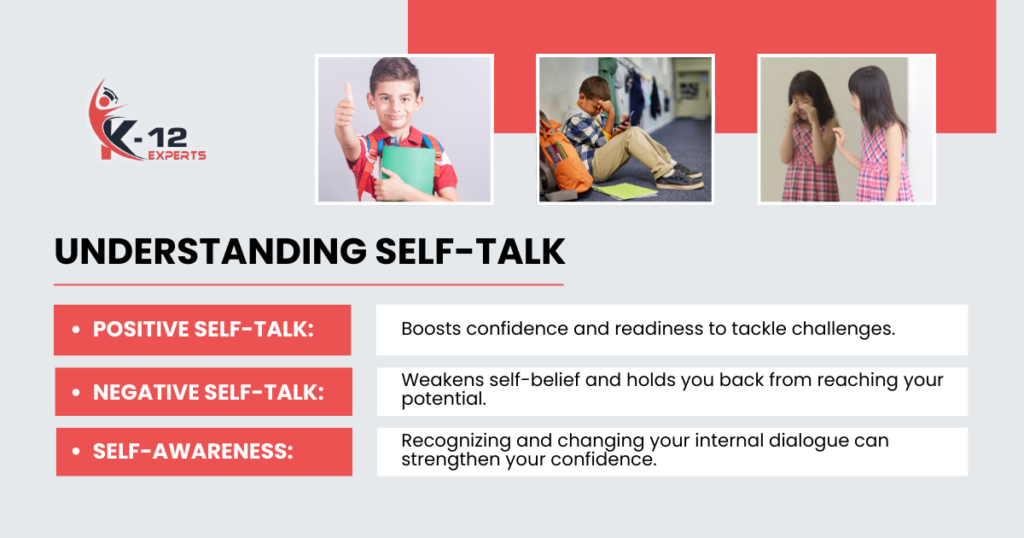
Your self-talk has a significant effect on your confidence. It influences how you face challenges and seize opportunities. When you think positively about yourself, you’re more likely to feel strong and ready to handle tough situations.
On the other hand, negative self-talk can weaken your self-belief. This is important because how you talk to yourself can either lift you up or hold you back. By recognizing your internal dialogue, you can learn to change it into something that boosts your confidence and helps you succeed.
For example, instead of saying, “I can’t do this,” try saying, “I will give it my best shot.” This small shift can make a big difference in how you feel about your abilities.
The Impact of Self-Talk on Confidence
Many students may not understand how much their inner thoughts affect their confidence. When you practice positive self-talk, it can lift your spirits and help you believe in yourself.
For example, telling yourself, “I am capable,” before giving a presentation can make you feel more confident and ready to take on the challenge. In contrast, negative self-talk can hurt your confidence. If you think, “I’m not good enough,” it can lead to self-doubt and poor performance.
Studies show that people who use positive self-talk tend to be more resilient and motivated, which improves their overall performance.
By focusing on positive self-talk, you can build a strong sense of confidence that helps you succeed in school, relationships, and other areas of life.
Identifying Negative Self-Talk Patterns
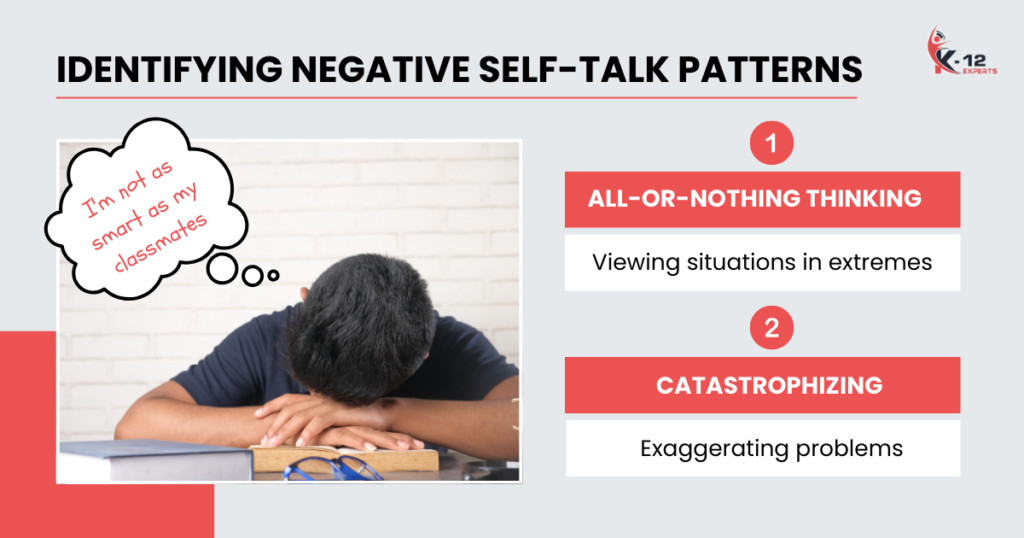
Negative thoughts can sneak into your mind, especially when you’re dealing with school and social challenges. For example, you might think that if you don’t get an A on a test, you’ve completely failed. This kind of thinking is called all-or-nothing thinking.
Another common pattern is catastrophizing, where you blow problems out of proportion, like thinking that one bad grade means you’ll never succeed.
It’s important to spot these negative thoughts because once you see them, you can work on changing them. By recognizing these patterns, you can start to talk to yourself more positively and improve your mindset.
Common Negative Thoughts in Students
Many students struggle with negative self-talk, which can hurt their confidence and school performance. It’s important to recognize these harmful thoughts to help build a positive mindset.
Here are some common negative thoughts students may have:
- “I’m not as smart as my classmates.”
- “I’ll never get into a good college.”
- “I need to be perfect to succeed.”
- “I always mess things up.”
These thoughts can come from the pressure of school, relationships with friends, and personal issues. Knowing that many others feel this way can make you feel less alone.
Teachers and counselors can help you tackle these thoughts through workshops and support groups. By challenging these negative beliefs, you can boost your confidence, improve your performance, and enhance your overall well-being.
Transforming Negative Self-Talk into Positive Affirmations
When you’re trying to turn negative self-talk into positive affirmations, it’s important to make sure these affirmations are realistic and uplifting.
Recognizing what you’re good at and what you can achieve can really change how you see yourself and what you’re capable of. For example, instead of saying, “I always fail,” you could say, “I learn from my mistakes and grow stronger.”
Creating Realistic and Empowering Affirmations
Transforming negative self-talk into positive affirmations is essential for boosting self-confidence in K-12 students. Here are four straightforward steps to create realistic and uplifting affirmations:
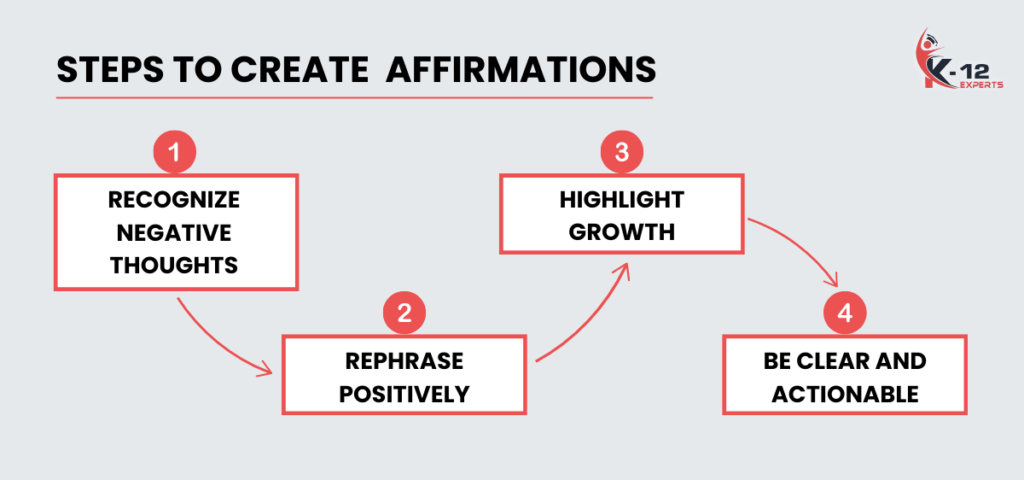
- Recognize Negative Thoughts: Start by identifying the negative beliefs that hold you back. This could be thoughts like “I’m not good at math” or “I always mess up.”
- Rephrase Positively: Change those negative beliefs into positive affirmations. For instance, instead of saying, “I can’t do this,” say, “I can learn to do this.” This shift helps you focus on your ability to grow.
- Highlight Growth: Focus on your potential for improvement. Rather than thinking, “I must be perfect,” try saying, “I get better with every attempt.” This encourages a mindset of progress rather than perfection.
- Be Clear and Actionable: Make your affirmations specific and actionable. Instead of vague statements, use examples like “I am studying hard for my exams” or “I practice my reading every day.” This gives you clear goals to work towards.
Practical Strategies for Promoting Positive Self-Talk
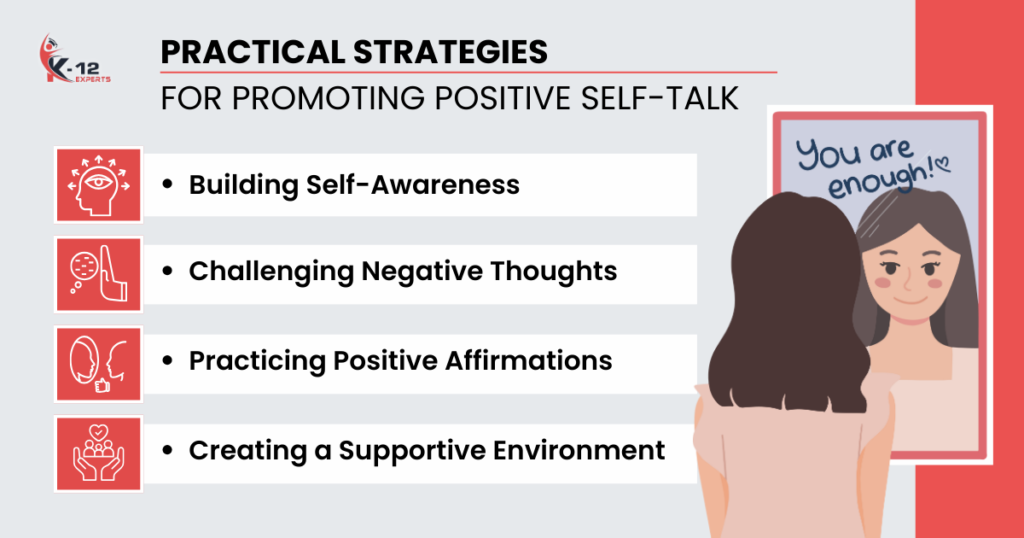
Promoting positive self-talk starts with recognizing your thoughts and shifting negative ones into encouraging affirmations.
Surrounding yourself with supportive people and creating an inspiring environment can further enhance your mindset, helping you build confidence and embrace challenges with optimism.
Building Self-Awareness
Building self-awareness is crucial for improving your inner dialogue. It helps you recognize and change the way you talk to yourself. Here are some simple strategies to boost your self-awareness:
- Reflect Daily: Take a few minutes each day to write down your thoughts and feelings. This practice helps you understand your emotions better.
- Practice Mindfulness: Try meditation or deep-breathing exercises. These activities allow you to watch your thoughts without judging them, giving you a clearer perspective.
- Identify Triggers: Keep track of moments that lead to negative self-talk. Write down what happens and how you respond. This will help you notice patterns in your thinking.
- Challenge Beliefs: When you catch yourself thinking negatively, pause and ask if those thoughts are really true. Questioning your beliefs can help you see things differently.
Challenging Negative Thoughts
Challenging negative thoughts is essential for improving your mindset and changing how you talk to yourself. Negative thoughts often pop up automatically, often influenced by past experiences or what society expects. The first step is to recognize these thoughts. This awareness allows you to take a moment to think about them critically.
Cognitive Behavioral Therapy (CBT) offers helpful techniques for spotting common thinking errors, such as assuming the worst or seeing things in black and white. Once you identify a negative thought, ask yourself: Is there real proof for this thought? How would you support a friend who feels this way? This process helps you gain a new perspective.
After questioning the negative thought, try to replace it with a more balanced one. For example, instead of thinking, “I always fail,” consider saying, “I can learn from this experience.”
This practice not only encourages positive self-talk but also promotes personal growth and resilience.
Practicing Positive Affirmations
Positive affirmations are a great way to change the way you think about yourself and increase your confidence. Here are some simple steps to help you practice positive affirmations effectively:
- Spot Your Struggles: Think about the areas in your life where you feel insecure. This could be related to your job, appearance, or relationships.
- Create Your Own Affirmations: Write down statements that reflect your feelings. For example, you might say, “I deserve love and respect.” Make it personal and meaningful to you.
- Stay Consistent: Say your affirmations every day. A good tip is to do this in front of a mirror, which can help make the messages feel more real and powerful.
- Use Visual Reminders: Place sticky notes with your affirmations in places you often see, like your bathroom mirror or fridge. This will help remind you to keep thinking positively about yourself.
Creating a Supportive Environment
Creating a supportive environment is crucial for helping K-12 students develop positive self-talk. To build this kind of space, start by looking at the people around you. Choose to spend time with friends and family who encourage you and celebrate your successes. This strong support system can really shape how you see yourself.
It’s also important to talk openly about your goals and dreams so that your loved ones can cheer you on instead of criticizing you.
Consider designing your surroundings to boost positivity. For instance, you might hang up motivational quotes or set up a cozy corner where you can think and relax.
Keep in mind that a negative environment can hold you back and reinforce any negative thoughts you might have. By being mindful of who you spend time with and how you arrange your space, you can create a nurturing atmosphere that builds your confidence.
This will help you succeed both in school and in your personal life.
The Long-Term Benefits of Positive Self-Talk
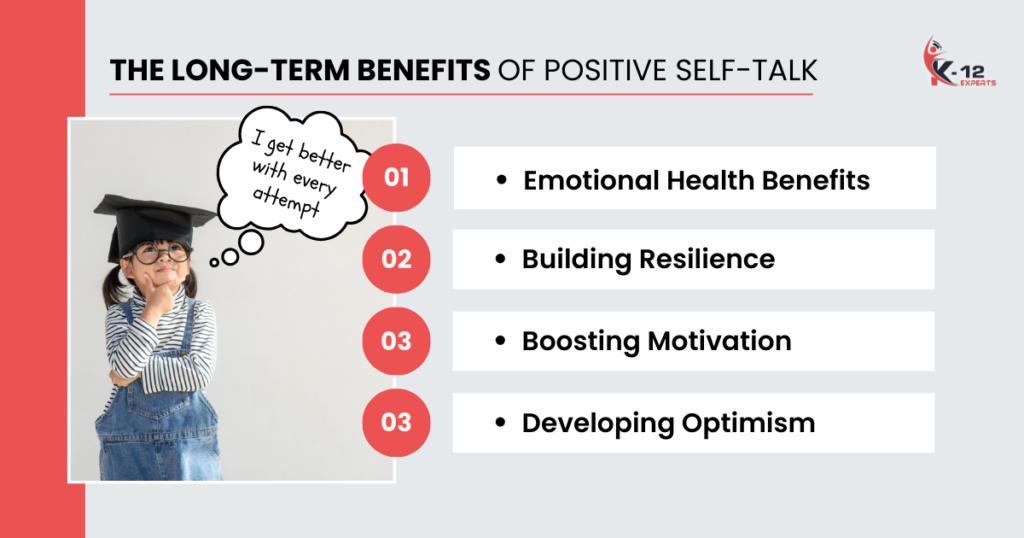
Using positive self-talk can greatly impact your emotional and mental health over time. When you make it a habit to speak kindly to yourself daily, you’re not just boosting your confidence but also laying the groundwork for a happier future.
Here are four essential benefits you can look forward to:
- Better Emotional Health: Positive self-talk helps you develop a healthier mindset, reducing stress and anxiety.
- Stronger Resilience: When faced with challenges, you’ll find it easier to cope and bounce back from setbacks.
- Higher Motivation: With a positive mindset, you’re more likely to follow your goals enthusiastically and determined.
- More Optimistic Perspective: By encouraging yourself, you’ll naturally start to see the brighter side of life, which can lead to greater happiness.
Frequently Asked Questions
How Can Teachers Incorporate Positive Self-Talk Into Their Lessons?
Teachers can model affirmations, encourage journaling about achievements, and promote group discussions to build confidence and self-esteem in students.
What Role Do Parents Play in Reinforcing Positive Self-Talk?
Parents can use affirmations, encourage resilience by supporting effort, and create a safe home environment to help children develop a positive mindset.
Are There Specific Ages When Self-Talk Is Most Impactful?
Self-talk is crucial for young children to build confidence and for teens to navigate challenges. Positive self-talk improves self-esteem at any age.
Can Positive Self-Talk Improve Academic Performance?
Positive self-talk enhances focus, motivation, and confidence, which can lead to better academic results. Believing in yourself makes a big difference.
What Resources Are Available for Teaching Self-Talk Skills?
Books, apps, and workshops on mindfulness and cognitive techniques offer tools for teaching self-talk skills to improve confidence and well-being.




